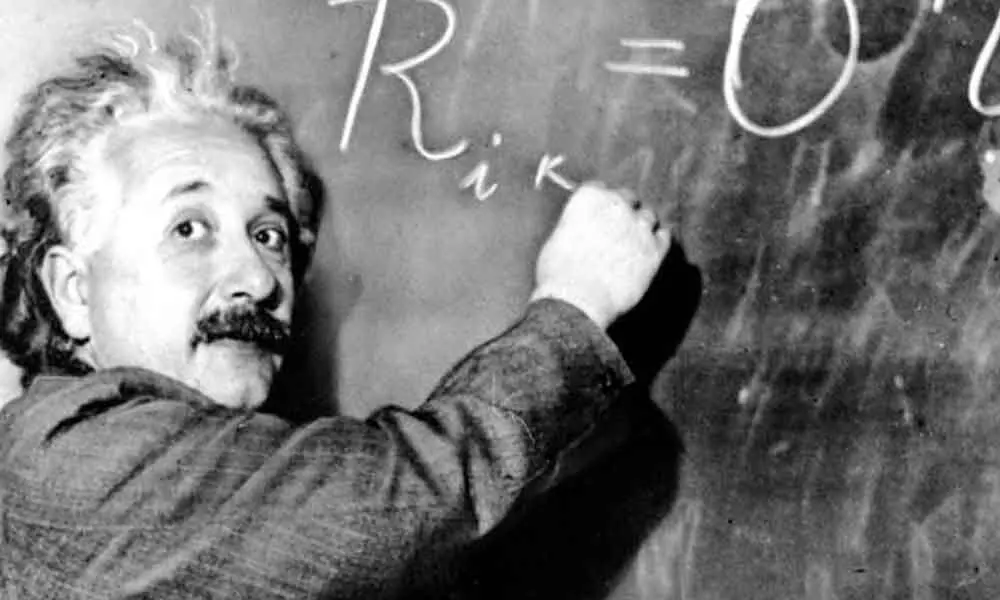Albert Einstein: Man of multitudes

Albert Einstein
Today is the birthday of German-born theoretical physicist
Walt Whitman in his illuminating poem 'Song of Myself' writes- "very well then I contradict myself, I am large, I contain multitudes." I do not know much about Walt Whitman, but there is another illustrious personality mankind has been blessed to have had him amongst them, who I get reminded of when I read these lines or vice-versa in fact, Albert Einstein. Since the genius he is, he does one better over us, he was large and multitudinous, yet not contradictory.
Early in life, I heard about how brilliant and intelligent Einstein was and in which I had an unquestionable faith since then. And when I did grow up to be of an age, when I could ask why he was considered so. I often had my physics book in front of me and I concluded that if someone had not only understood that subject but had also worked with it all of his life and went on to create a large and most effective part of it, he had to be super brilliant.
Even after I grew up, until very recently, I continued to learn more and more about Einstein and the various facets of his life and personality never did he sound anything but brilliant and a genius because here is an individual who had discovered and theorised a corpus of knowledge enough even after a century for great scientists to work on ceaselessly and arrive at newer findings to help mankind. People smarter than most of us, are able to understand and fathom his life's work only now, after all these years, that too, only in bits and pieces. Obviously, it is an undeniable fact that he was one of the most brilliant people to have lived on this planet!
And I have realised now that, this is a very restricted way of appreciating his genius as Einstein's brilliance lies not just in his scientific achievements but more in his rare feat of reconciling all the multitudinous aspects of his genius into one unified persona. No wonder that he had such an unflinching faith in the unified field theory. When he could do it, of course, the nature, universe, with its supreme intelligence could do it much more effectively, he must have believed. He was not a man of contradictions; he was just vast and multitudinous. The genius that he is , he was a scientist, a philosopher, a humanist and a mystic: a loner and a people's person at the same time; a family man and an ascetic; religious and a non-believer - all at once.
A family man who was an ascetic
He was often described as a recluse, indifferent to everything except his work. But he was also a man who fell in love with his first wife, Mileva, married her despite his mother's protests that she was a Serbian. They had two sons. He was a great baby-sitter as his wife Mileva reveals, who took care of the kids with ease while she attended to her daily chores.
With his younger son on the left shoulder, he used to work on his equations with his right hand effortlessly even as he kept responding to the doubts of his inquisitive elder son. Later on the couple got estranged due to certain emotional differences and disturbances that finally led to their divorce. And he was optimistic enough to give the institution of marriage another try even after the failure of his first marriage.
His mother's suffering with cancer affected him like nothing else. At all these points of his life he loved and cherished his solitude immensely. And he never ceased to worship his work spending hours and hours working on his theories and burning the midnight oil to arrive at solutions even when his marriage was falling apart, his son was diagnosed with schizophrenia and his mother was dying. He lived his life like a meditation. An ascetic who had only one purpose in life. A grihastha and a sanyasi at the same time.
A lone traveller- the "citizen of the world"
He called himself a lone traveller. But he had a deep sense of social responsibility, so much so that he re-embraced his German citizenship he had earlier renounced in 1896, at the age of 16, just to give hope to the people of Germany that they could rise again from the ruins of the first war. He thought that since his name was associated with scientific hope and optimism, this act of his would generate positivity among the people of Germany.
Einstein is also known to have worked tirelessly towards global causes such as international peace, disarmament, for peace between the Arabs and the Jews. He wrote letters to Franklin Roosevelt, the then American president, to consider a non-use of atomic weapons as it would unleash global destruction and a chain of nuclear armament across the world. It was unfortunate that Roosevelt passed away without ever opening this letter and his successor Truman went ahead and unleashed the bomb whose giant mushroom cloud continues to haunt us all to this day.
He often remarked how he wanted to be a citizen of the world and yet cherished his solitude and could not get enough of it. He once expressed that he has never belonged to a country or state or to the circle of his friends or even to his own family wholeheartedly and all his ties have always been accompanied by a vague aloofness and the wish to withdraw himself. Yet, he always was as sweet and amiable towards the crowds that came to see and greet him at any event in any part of the world that he would visit and often was teary eyed while saying goodbye.
A deeply religious non-believer
He once said, the religion and god he believed in were not the ones that spoke about fate and were involved with the affairs of mankind alone. He was once asked by a six-year-old girl, during one of his visits to the New York city,- "Do scientists pray?" to which he said: "Scientific research is based on the idea that everything that takes place is determined by laws of nature, and this holds good for the actions of people. For this reason, a scientist will hardly be inclined to believe that events could be influenced by prayer, in other words, by a wish addressed to a supernatural Being."
His answer did not end there, he continued to say: "Everyone who is seriously involved in the pursuit of science becomes convinced that a spirit is manifest in the laws of the Universe- a spirit vastly superior to that of man, and one in the face of which we with our modest powers must feel humble. In this way the pursuit of science leads to a religious feeling of a special sort, which is indeed quite different from the religiosity of someone more naïve." He declared multiple times that his religion was free of any scriptures, worship, rituals or idols. He was religious in the sense that he had a deep veneration for the inexplicable and the intangible behind all that was discernible by our limited knowledge in the nature.
The mystic-scientist
We all know Albert Einstein to be many things- an 'academician', a scientist, a mathematician, a theoretical physicist, a music enthusiast who played violin effortlessly. Some considered him a philosopher, earlier as a censure and later in a more respectful way as the philosopher-scientist. He was all these things and also a mystic. The theory of relativity and the theory of the unified field of Einstein have their origins in his imagination rather than in his experiments. How could he see something that he could not have seen in his experiments?
He was not awarded the Nobel for a long time because his theory of relativity was not tested and confirmed. So many of his contemporaries such as Philip Lenard often criticised Einstein saying that he was more of a philosopher than a scientist, as did some other contemporaries of his, since it was too hard for them to fathom his theories, let alone test them. They could work only on what they could see, test, and prove unlike Einstein who also had a vivid imagination and appetite for the unknown. Though a scientist himself, he did not let science prolong his life because he considered prolonging his life by artificial means as going against nature. Declining to be operated upon he passed away not very long after diagnosed with stomach aortic aneurysm. He was a scientist who often spoke of what god is to him and how he was deeply religious because of science, not despite it. He famously stated that "Science without religion is lame and religion without science is blind".
Contradictions and connections
Most of us struggle to understand even one dimension of ourselves completely, let alone the various dimensions of our personality. When we try to understand these multiple sides, we end up struggling with cognitive dissonance and endless dilemmas. But here was a man who not only understood most of the aspects of his personality, reconciled all of them, all with the awareness and acceptance that there is much more he does not know and that he was just a part of this large unified being. What might seem like a contradiction to all of us, was not so for him. Everything was unified for him. He once remarked, he does not recognise where one individual ceased, and another began. In fact, he once described himself as a militant-pacifist. One who is willing to fight for peace. He was someone who believed and supported democracy.
Einstein also believed that there is no such thing as free will in the world. He had no problem in having faith in two opposite things because he never saw anything as contrary to one another and he only pursued truth and nothing else like a true scientist. He could do this because he was truly open minded and objective. His saintly detachment and asceticism allowed him to see everything as it is. The humanly responsible side of him made him kind and empathetic. He had the ability to accept two seemingly opposite things at once, find a way to reconcile them and also become a sanctuary to them both.
He was not contradictory, he was balance. He was one. He was unified just as he believed this universe to be. He proved his theories by living them, where in lies the unparalleled genius of Albert Einstein.
(The author is an Advocate with Telangana High Court)










